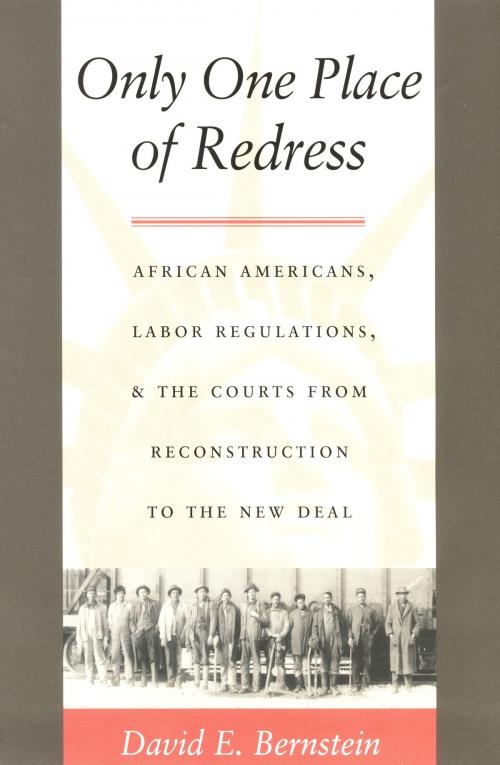Only One Place of Redress
African Americans, Labor Regulations, and the Courts from Reconstruction to the New Deal
Nonfiction, Reference & Language, Law, Labour & Employment, Legal History, Social & Cultural Studies, Social Science, Cultural Studies, African-American Studies| Author: | David E. Bernstein, Neal Devins, Mark A. Graber | ISBN: | 9780822383055 |
| Publisher: | Duke University Press | Publication: | January 18, 2001 |
| Imprint: | Duke University Press Books | Language: | English |
| Author: | David E. Bernstein, Neal Devins, Mark A. Graber |
| ISBN: | 9780822383055 |
| Publisher: | Duke University Press |
| Publication: | January 18, 2001 |
| Imprint: | Duke University Press Books |
| Language: | English |
In Only One Place of Redress David E. Bernstein offers a bold reinterpretation of American legal history: he argues that American labor and occupational laws, enacted by state and federal governments after the Civil War and into the twentieth century, benefited dominant groups in society to the detriment of those who lacked political power. Both intentionally and incidentally, claims Bernstein, these laws restricted in particular the job mobility and economic opportunity of blacks.
A pioneer in applying the insights of public choice theory to legal history, Bernstein contends that the much-maligned jurisprudence of the Lochner era—with its emphasis on freedom of contract and private market ordering—actually discouraged discrimination and assisted groups with little political clout. To support this thesis he examines the motivation behind and practical impact of laws restricting interstate labor recruitment, occupational licensing laws, railroad labor laws, minimum wage statutes, the Davis-Bacon Act, and New Deal collective bargaining. He concludes that the ultimate failure of Lochnerism—and the triumph of the regulatory state—not only strengthened racially exclusive labor unions but contributed to a massive loss of employment opportunities for African Americans, the effects of which continue to this day.
Scholars and students interested in race relations, labor law, and legal
or constitutional history will be fascinated by Bernstein’s daring—and controversial—argument.
In Only One Place of Redress David E. Bernstein offers a bold reinterpretation of American legal history: he argues that American labor and occupational laws, enacted by state and federal governments after the Civil War and into the twentieth century, benefited dominant groups in society to the detriment of those who lacked political power. Both intentionally and incidentally, claims Bernstein, these laws restricted in particular the job mobility and economic opportunity of blacks.
A pioneer in applying the insights of public choice theory to legal history, Bernstein contends that the much-maligned jurisprudence of the Lochner era—with its emphasis on freedom of contract and private market ordering—actually discouraged discrimination and assisted groups with little political clout. To support this thesis he examines the motivation behind and practical impact of laws restricting interstate labor recruitment, occupational licensing laws, railroad labor laws, minimum wage statutes, the Davis-Bacon Act, and New Deal collective bargaining. He concludes that the ultimate failure of Lochnerism—and the triumph of the regulatory state—not only strengthened racially exclusive labor unions but contributed to a massive loss of employment opportunities for African Americans, the effects of which continue to this day.
Scholars and students interested in race relations, labor law, and legal
or constitutional history will be fascinated by Bernstein’s daring—and controversial—argument.















